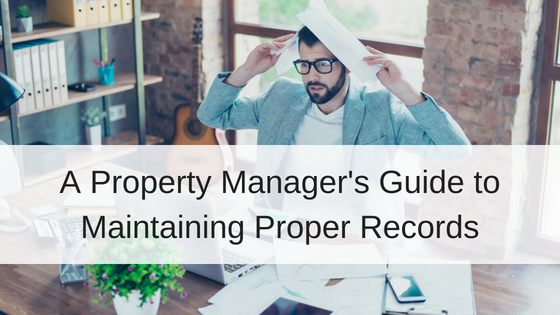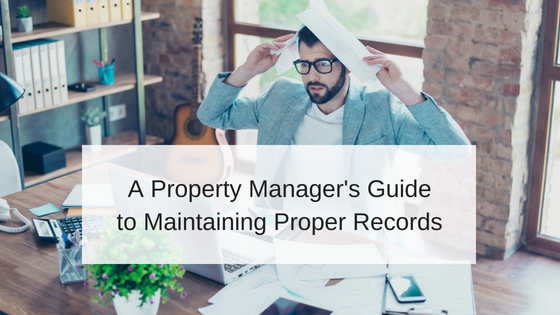 Proper file management for landlords and property managers can save you tons of time if ever faced with an audit, legal dispute, Fair Housing claim, or if you simply need to find specific lease terms.
Proper file management for landlords and property managers can save you tons of time if ever faced with an audit, legal dispute, Fair Housing claim, or if you simply need to find specific lease terms.
Like most businesses, state and federal guidelines dictate which files professionals in the rental industry must keep and for how long in regards to tenants, owners, properties, finances and other important business documents.
In general, the length of time a document should be kept is dependent upon the respective statute of limitations for any type of case that might brought for a potential cause of action. Storing and managing files appropriately comes down risk management in order to protect yourself and your business if necessary.
The information below offers general information about important files related to property management. While it might seem like an exhaustive list already, there may still be items you find are important or necessary for your ensuring compliance with state requirements and to protect your rental business.
Tenant Files
Landlords and property owners are responsible for maintaining records related to current and past tenants. Important tenant files may include:
- Tenant rental application and screening reports
- Correspondence regarding approval or denial of rental application
- The signed lease or rental agreement, plus any changes or updates added during tenancy
- Security deposits, security deposit refunds, and an itemized list for any deductions
- Move-in inspection paperwork completed by you and your tenant
- Move-out inspection paperwork, especially as it relates to a tenant’s security deposit
- Rent payment records
- Rental fee records (late fees, cleaning fees, pet fees etc.)
- Pet policy agreement and pet deposit records
- Written requests for entry
- Rent increase notices
- Property maintenance notices
- Workorder or maintenance requests, and details of how and when they were handled
- Lease violations and corresponding action records
- Eviction paperwork and records
- Legal notices and corresponding actions
- All emails and correspondence with tenant
You should also retain application records, tenant screening and all correspondence regarding approval or denial of rental applications from all rental applicants even if they never lived at one of your rental properties – retaining rental applicant data will help protect you if an applicant files a discrimination claim.
Owner Files
If you provide property management services for owners, you will need to keep records of your management agreements, any property files listed below, and payment records related to rental income, management fees, or property maintenance. Owner files can include:
- Owner-Manager Agreement
- All owner property files (see below)
- Requests and approval for property maintenance, and details about how and when they were handled
- Management Fee payment records
- Owner rent payments and payments using owner funds
- All emails and correspondence with owners
Owners can be known to dispute charges related to property maintenance, so make sure your signed management agreement outlines how you will handle work order requests and what the process is for using owner funds for approved property maintenance. Property managers should keep excellent records of all correspondence, bids, invoices, and payment records related to property maintenance in case an owner disputes it later.
Property Files
Depending if you own rental property or simply manage rental properties for other owners, your record retention requirements regarding property files may be different. Important rental property files may include:
- Move-in inspection paperwork at the start of each tenancy
- Move-out inspection paperwork, especially as it relates to damage, wear & tear, and required maintenance
- Work Order repair requests, and details of how and when they were handled
- Property deeds and mortgage information if applicable
- Property Tax records if applicable
- Inspection records and maintenance updates
- Insurance policies
- Marketing information and property photos
- Photos related to property maintenance and property damage
- Invoices and receipts for property maintenance
Vendor Files
Property managers and landlords work with all sorts of vendors related to their properties and business. Organizing and storing vendor files appropriately will help you come tax time when submitting your 1099-MISC documents and if a dispute ever arises. Vendor files may include:
- Vendor screening files
- Vendor contracts
- Workorders requests, bids and details of how and when they were handled
- Email and correspondence
- Invoices and receipts
- Payment records
- 1099-MISC documents
Financial Records
Whether you manage your own rental properties or provide property management services for your owners, maintaining proper financial records is important for completing your tax appropriately every year, ensuring proper trust accounting compliance, and surviving an audit. You should be familiar with your state’s requirements for how long you must keep financial records for your rental business which can include:
- Bank statements
- Proof of Deposits/Bank Deposit Slips
- General Ledger/Check Register
- Copies of checks
- Owner Ledgers
- Tenant Ledgers
- Personal Funds Ledger
- Invoices and receipts (both incoming and outgoing)
- Purchase orders
- Security deposit refund and deduction records
Business Documents
Maintaining files that relate specifically to structure of your property management business are essential for ensuring legal compliance, securing new clients, or surviving an audit. Important business files may include:
- Business licenses and permits
- Property Management or Real Estate Broker’s licenses as required by your state
- Insurance documents
- Tax Returns and supporting tax documents
- Audit Records
- Employee records
- Legal documents and records
These are just some of the important files and documents related to property management that one needs to keep to meet legal requirements and protect yourself if ever faced with legal charges. You should always check with your state and local laws to find our specific requirements regarding record retention, how long you need keep files, and the proper way of destroying sensitive data.
The majority of theses files contain sensitive and personal information. Proper secure storage is vital, in order to protect the person or business the information pertains to and also be compliant with the law. Make sure your storage system involves highly secure measures.
Secure File Storage Systems
The best way to securely store multiple files, for multiple years, that can be easily organized, referenced and accessed is to use cloud-based storage options. Paper files take up too much physical space, can get misplaced or lost or damaged forever if a disaster struck. A computer, server, or storage device can crash, get hacked, get a virus, or the machine may just quit working. The risks associated with physical file management or hard drive data storage are too great when handling so much important information.
Storing data online is now recognized as the most reliable and simplest method to store your important files. Your property management software provides users with the extra security and redundancy to store unlimited files securely online.
Rentec Direct offers clients an unlimited amount of secure online storage for all of their important business documents as well as integrated accounting, owner, property, tenant and vendor features that provide clear documentation of important data related to these aspects of your rental management business. Documents can be uploaded to the program to be stored in the Master File Library or assigned directly to a corresponding tenant or property.
To learn more about how you can start using Rentec Direct’s secure file storage visit the – Knowledge Base Article – File Library (File Storage).
Want to learn more about how seriously Rentec Direct takes data security? Check out these articles:
- Data Security with Rentec Direct
- Property Managers and Landlords Protected from Recent Cyber Attack
- Feature Friday: Online Data Storage – Why the Cloud is Safer than Your Computer
Not a Rentec Direct user yet? You can access all the powerful functions in the easy-to-use property management software with a free 2 week trial today- learn more!







Is management allowed to purge current tenant paper files or store them in a different storage area off property in California?
That’s an interesting question. I would recommend reaching out to your local housing authority as they would have the most accurate information on the current regulations in your state/county/city regarding record storage.
How can I get access to my past maintenance work on the condo that I rent
If you’re looking for information on repairs done before you rented the unit, I’m not sure either are required to share that information. For requests you’ve made or maintenance/repair done during your tenancy, you would likely need to reach out to the landlord/owner or HOA depending on your lease agreement terms and the type of repairs. Most often than not, exterior repairs are handled by the Condo or Home Owner Association and interior repairs the landlord/owner.